
War in Your Stomach
What's in the Story?
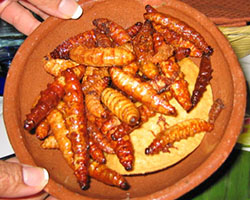
Our world is made up of many cultures and customs. Across the globe, people have unique holidays and eat different types of food. These differences are easy to notice. But you might be surprised to learn that there are some differences between people that you need a microscope to see.
For example, let's think about the digestive system. Every person has a small world inside their digestive system. This world is made up of tiny organisms called bacteria. You may have heard of bacteria that make people sick, but the bacteria in our bellies can be good for our bodies. Not everyone has the same kinds of bacteria in their bodies. The types of bacteria in a person’s body can actually affect that person’s health.
So, what is different about bacteria that live inside people on opposite ends of the world? In the Evolution, Medicine, and Public Health article, “Elevated levels of adaption in Helicobacter pylori genomes from Japan; a link to higher incidences of gastric cancer?”scientists studied the differences in stomach bacteria between people around the world. They also looked into how these differences relate to human health.
Helicobacter pylori – Friend or Foe?
If you could look in your stomach with a microscope, you'd find that there are lots of friendly bacteria inside of you. Many of these help you break down food. But Helicobacter pylori (H. pylori) is a bit different. H. pylori is involved in protecting our stomachs. Most people in the world have H. pylori in their stomachs and it does not make them sick.
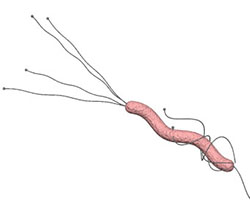
Helicobacter pylori is a spiral-shaped bacteria. This spiral shape allows it to screw into the lining of the stomach.
Image by Y tambe.
But sometimes, H. pylori is pathogenic, meaning that it does make people sick. It has been linked to stomach ulcers, which are injuries to the stomach lining. H. pylori may even be linked to stomach cancer.
The chances of a person getting stomach cancer are higher in some countries compared to others. Because H. pylori might contribute to stomach cancer, it is a prime suspect for the scientists trying to figure out why people in some countries get stomach cancer more often than others. Scientists thought that maybe differences in stomach cancer rates could be linked to differences in H. pylori. Specifically, they thought that the characteristics of H. pylori in certain countries could make it more likely to contribute to risk of cancer.
H. pylori and Stomach Cancer
In Japan, stomach cancer is more common than it is in Europe. Because of this, scientists studied H. pylori in both regions to see if Japanese H. pylori have different characteristics compared to European H. pylori. They also tested how this might lead to increased stomach cancer in Japan.
You may be wondering how these bacteria differ. The way bacteria work is controlled by DNA. Genes in DNA let bacteria produce certain proteins that do most of the work in the cell. These proteins help the bacteria survive in a human host. These proteins might help them stick to the inside of the host’s stomach, grow, get food, and avoid attack from the host’s immune cells. These traits all come from proteins, which come from genes. This is why scientists looked at genes to see how bacteria in Japan and Europe might be different from each other.
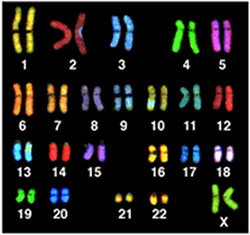
Scientists compared the genes of bacteria in Japan and Europe by looking at their genomes. A genome is all of the genes in an organism. When scientists sequence a genome, they can then look at the exact order of molecules within DNA. By sequencing the H. pylori genomes, the scientists could test if Japanese H. pylori have different genes than European H. pylori. If the H. pylori have different genes, they might have different traits that could provide information about their roles in stomach cancer.
Scientists compared H. pylori in two regions of Japan (Kyoto and Fukui) and four regions of Europe (Italy, France, Germany, and the UK). They found that certain genes in Japanese H. pylori (such as those that help them avoid attack from the host’s immune cells) are especially important for the bacteria to survive. All bacteria need such traits to survive in a host, but the Japanese H. pylori needed these traits to survive more than the European H. pylori.
The Arms Race: Bacteria and the Immune System
Why is it so important for the Japanese H. pylori keep specific genes in their population? The human immune system is made up of cells that are trained to attack pathogenic bacteria. Some bacteria can protect themselves from the immune system if they have certain genes. Scientists in this study found that the H. pylori in Japan have a greater need for genes that allow them to survive and escape the immune system compared to European H. pylori.
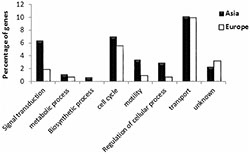
The scientists think this may be due to differences in host immune function. If Japanese people have immune functions that attack bacteria more fiercely, the bacteria in those people must avoid attack better. Because of this, the Japanese bacteria are more likely to have these genes. This means that they start occurring more often in the population, a process called positive selection. Individual bacteria with these particular genes are more likely to survive than those without these genes. The survival of the European H. pylori did not depend nearly as much on keeping those specific genes in the population compared to the Japanese H. pylori.
The immune system, although it helps us fight the microbes that make us sick, comes with a cost. When you get a splinter or cut, sometimes the skin around it turns red, swells up, and becomes hot to the touch. This is called inflammation, and even though it is painful, it is a sign that your immune system is doing its job.
The more aggressive the immune system is at attacking H. pylori in the stomach, the more inflammation will occur in the stomach. The researchers think that this inflammation may be one of the main causes of stomach cancer. This means that people with more aggressive immune systems, like in the Japanese population, may have a greater risk of getting stomach cancer.
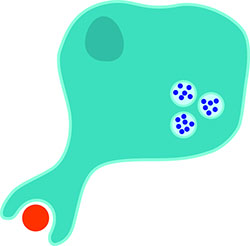
This is an arms race. The better the immune system gets at killing H. pylori, the better H. pylori must get at escaping the immune system. Even though a very aggressive immune system might protect from illness, it may be a risk factor for stomach cancer due to high levels of inflammation.
All wars have winners and losers, right? The outcome of this war is not that clear. H. pylori is the stomach’s very own double agent. It provides protection but can also become pathogenic in some cases. This study suggests that H. pylori is more likely to contribute to gastric cancer if the immune system attacks it aggressively. That is what makes this war so interesting. Fighting is not necessarily the way to win!
EvMed Edits are sponsored by ASU's Center for Evolution and Medicine.
Additional images via Wikimedia Commons. Gastric image by 藤澤孝志.
Read more about: War in Your Stomach
Bibliographic details:
- Article: War in Your Stomach
- Author(s): Mylan Blomquist
- Publisher: Arizona State University School of Life Sciences Ask A Biologist
- Site name: ASU - Ask A Biologist
- Date published:
- Date accessed:
- Link: https://askabiologist.asu.edu/evmed-edit/stomach-cancer-cause
APA Style
Mylan Blomquist. (). War in Your Stomach. ASU - Ask A Biologist. Retrieved from https://askabiologist.asu.edu/evmed-edit/stomach-cancer-cause
Chicago Manual of Style
Mylan Blomquist. "War in Your Stomach". ASU - Ask A Biologist. . https://askabiologist.asu.edu/evmed-edit/stomach-cancer-cause
Mylan Blomquist. "War in Your Stomach". ASU - Ask A Biologist. . ASU - Ask A Biologist, Web. https://askabiologist.asu.edu/evmed-edit/stomach-cancer-cause
MLA 2017 Style

Be Part of
Ask A Biologist
By volunteering, or simply sending us feedback on the site. Scientists, teachers, writers, illustrators, and translators are all important to the program. If you are interested in helping with the website we have a Volunteers page to get the process started.
